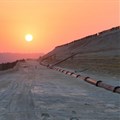Energy Minister Ramokgopa has proposed amendments to South Africa's Nuclear Energy Act, aiming to tighten controls over restricted nuclear materials and equipment. The updates will classify and regulate substances such as uranium and thorium, enhancing national security and aligning with international non-proliferation standards. These changes will increase oversight and compliance requirements for nuclear facilities, potentially raising operational costs but ensuring sustainable and ethical use of nuclear technologies.

Koeberg remains South Africa's sole nuclear power station, but the amendments could pave the way for more development. Source: Eskom
Under these amendments, specific categories of nuclear materials will face new restrictions.
These materials include “source material,” such as uranium and thorium, “special nuclear material” for reactor fuel and weapons, and broader “nuclear-related equipment and material” necessary for nuclear applications.
The precise terms of restricted materials have been broadened to enhance regulatory control and align South Africa with international non-proliferation norms, ensuring responsible use in both civilian and industrial contexts.
Increased oversight
The revised regulations signal South Africa’s intensified approach to nuclear oversight, enhancing national security and compliance with international standards.
Possible impact on the nuclear energy sector could be limited access to specific materials, and stricter operations and compliance requirements for nuclear facilities, medical suppliers, research institutions, and industries dependent on radioactive materials.
For companies, these changes mean more stringent protocols for licensing, handling, and reporting, potentially increasing administrative and operational costs.
Sustainability
For nuclear-dependent sectors, especially energy and healthcare, this regulatory framework will ensure that nuclear innovations adhere to sustainable and ethical practices.
By restricting access, the government is trying to minimise risks associated with nuclear technologies while encouraging safe research and development.
South Africa’s nuclear energy aspirations will require industry players to adapt swiftly and comply with these amendments, possibly accelerating investments in safer, renewable alternatives to complement nuclear power.
Koeberg life extension
These proposed amendments come after the International Atomic Energy Agency (IAEA) recently completed a follow-up review of the long-term operational safety of South Africa’s Koeberg Nuclear Power Plant in September.
The review, requested by Eskom, focused on the plant’s progress in addressing recommendations from a 2022 IAEA mission.
"Eskom has worked diligently to demonstrate and ensure the safe operation of the Koeberg plant today and into the future," said Eskom’s chief nuclear officer, Keith Featherstone.
The final report will be submitted to the plant management, the National Nuclear Regulator, and the government within three months.


































